Why is the peloton hiding its true colours?
There is a conspicuous absence of openly LGBTQ+ riders in the pro peloton, especially among the men. David Bradford speaks to the pros with first-hand insight
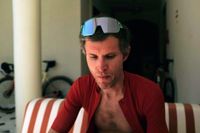
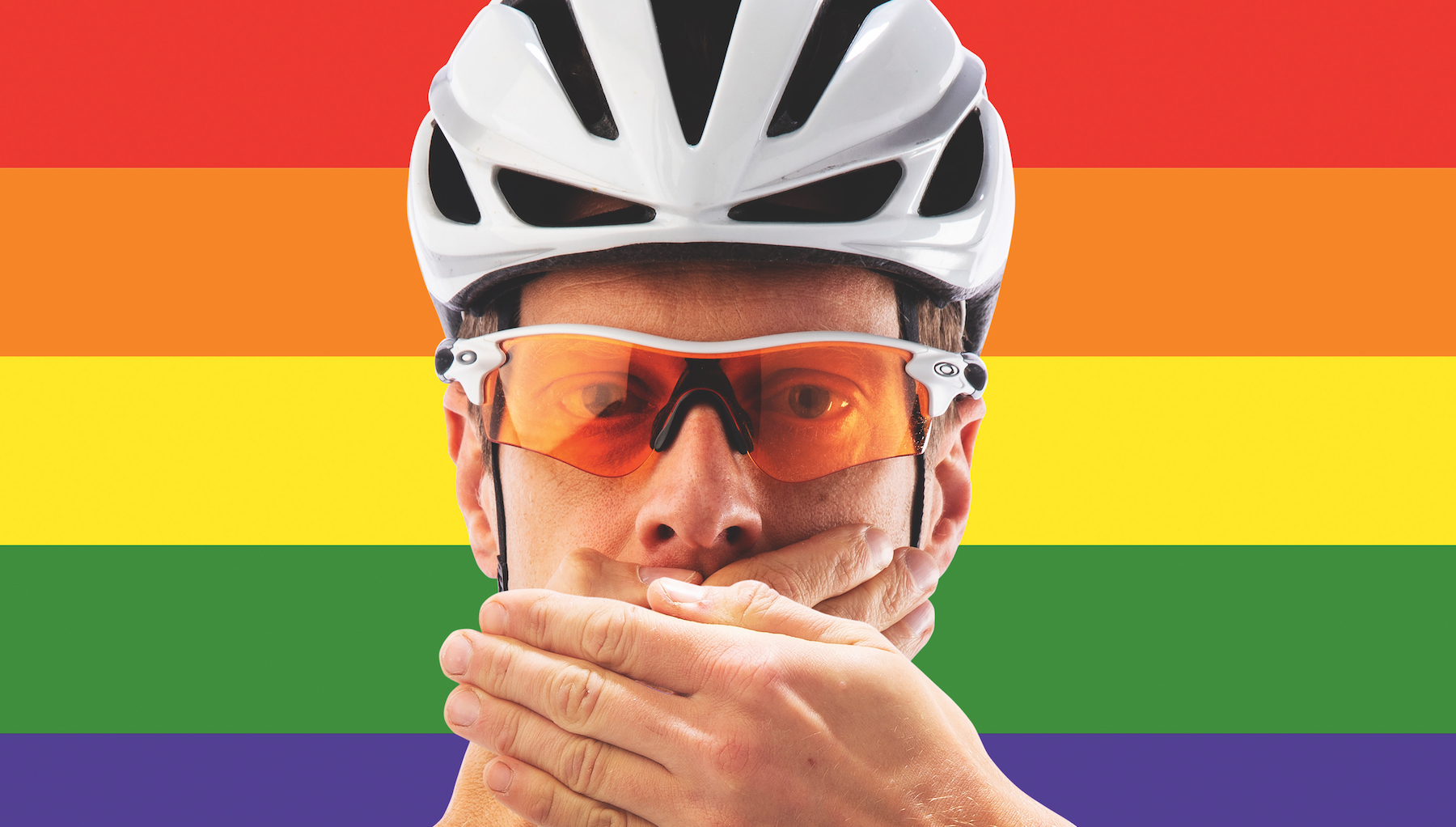
The latest race content, interviews, features, reviews and expert buying guides, direct to your inbox!
You are now subscribed
Your newsletter sign-up was successful
Of the 978 riders in the men’s pro peloton, none are gay.
While this statement is true on the surface – not a single male rider at WorldTour or ProTeam level publicly identifies as gay – it’s starkly implausible as soon as that surface is scratched.
Estimates on the proportion of UK and US people who are gay or bisexual range from about three to seven per cent.
If we take the low-end estimate for men, three per cent, then you would expect there to be about 30 gay or bi riders in the pro peloton – enough for a whole WorldTour squad.
Based on those numbers, the probability that all 978 riders are straight is one in ten trillion.
The question, then, is not whether there are gay pros but why none of them feel free to be open about who they really are.
As a gay man who has worked in sports media since the mid-Noughties, I can appreciate why a rider might feel compelled to keep their sexuality a secret.
The latest race content, interviews, features, reviews and expert buying guides, direct to your inbox!
Even in magazine offices – surely less laddish than race paddocks – I’ve lost count of the casually homophobic comments I’ve heard.
Generally these have not been intentional insults but rather thoughtless so-called banter, “gay” used as a pejorative term, and being gay only ever mentioned in terms of speculation or cheap humour.
For a long time it felt like revealing my sexuality would be to risk being judged as weak or even laughable.
What must it be like for a rider in equivalent circumstances? It was time to find out.
Ryan (not his real name) is a gay rider who trained among top-flight pros and competed in several UCI races before dropping out of the sport a few years ago.
Now in his mid-20s, he has agreed to speak to CW on condition of anonymity. “None of the riders I trained with would be explicitly homophobic in an abusive way,” Ryan tells me. “It was just that there was just no space for being open about it. Cycling is very much a masculine world where people do anything to fit in and avoid showing weakness.”
He describes a pressure to conform, on and off the bike, that never let up.
“When all you do is train with the same people every day, there’s not much news to talk about – it’s just chatting about women, laddish kind of stuff, and it would have seemed very odd if I wasn’t taking part.” Rather than take the risk, Ryan played the role expected of him.
“I’d just go along with it,” he says. “It’s hard as a young rider but I was able to compartmentalise and focus on my cycling goals. I didn’t want anything to hinder my progress.”
He explains that securing rides on teams was “all about who you know” and suspected these connections would be harder to foster as a gay rider, possibly to the detriment of his career.
Did this affect how he felt towards the sport? “Yes and no,” he pauses. “It was only after a period of injury, when I was out of the sport for several months, that I realised I didn’t want to go back to living a lie – it wasn’t healthy.”
I ask Ryan why in his view so many riders feel the need to assert their masculinity and straightness in a way that stifles open conversation. “It’s ironic, isn’t it, in a sport where men walk around in Lycra showing off their shaved legs and their tan, and care so much about appearance?” It’s true – no one can deny that cycling has a flamboyant side far removed from conventional masculinity; does he suspect a form of over-compensation?
“Yeah it’s partly because of the shaved legs, the tan, they need to prove themselves more masculine, more male.”
Ryan is now happily pursuing a new career outside of cycling, and harbours neither ill feelings towards his former fellow riders nor regrets about his time in the sport.
Even so, the fact he feels the need to remain anonymous here speaks for itself.
He hopes his story will make riders “more aware that how they act has an effect on others” and that gay riders coming through the ranks today will feel free to be wholly themselves. “We need to get to the point, not just in cycling but in society, where a person’s sexuality just doesn’t matter.”
Cycling behind society
The personal testimony from Ryan chimes with research showing that most LGBTQ+ sportspeople have experienced homophobia; many end up feeling ostracised and suffer related mental health problems.
Are sports like cycling lagging behind the rest of society? My perception as a 39-year-old is that wider societal attitudes towards sexuality and gender have undergone a sea change since I was at school in the Nineties, with what seems like accelerated progress over the past five or 10 years.
But what about in sport specifically? I wanted to speak to a young rider who had recent firsthand experience – and I found someone uniquely well placed to comment.
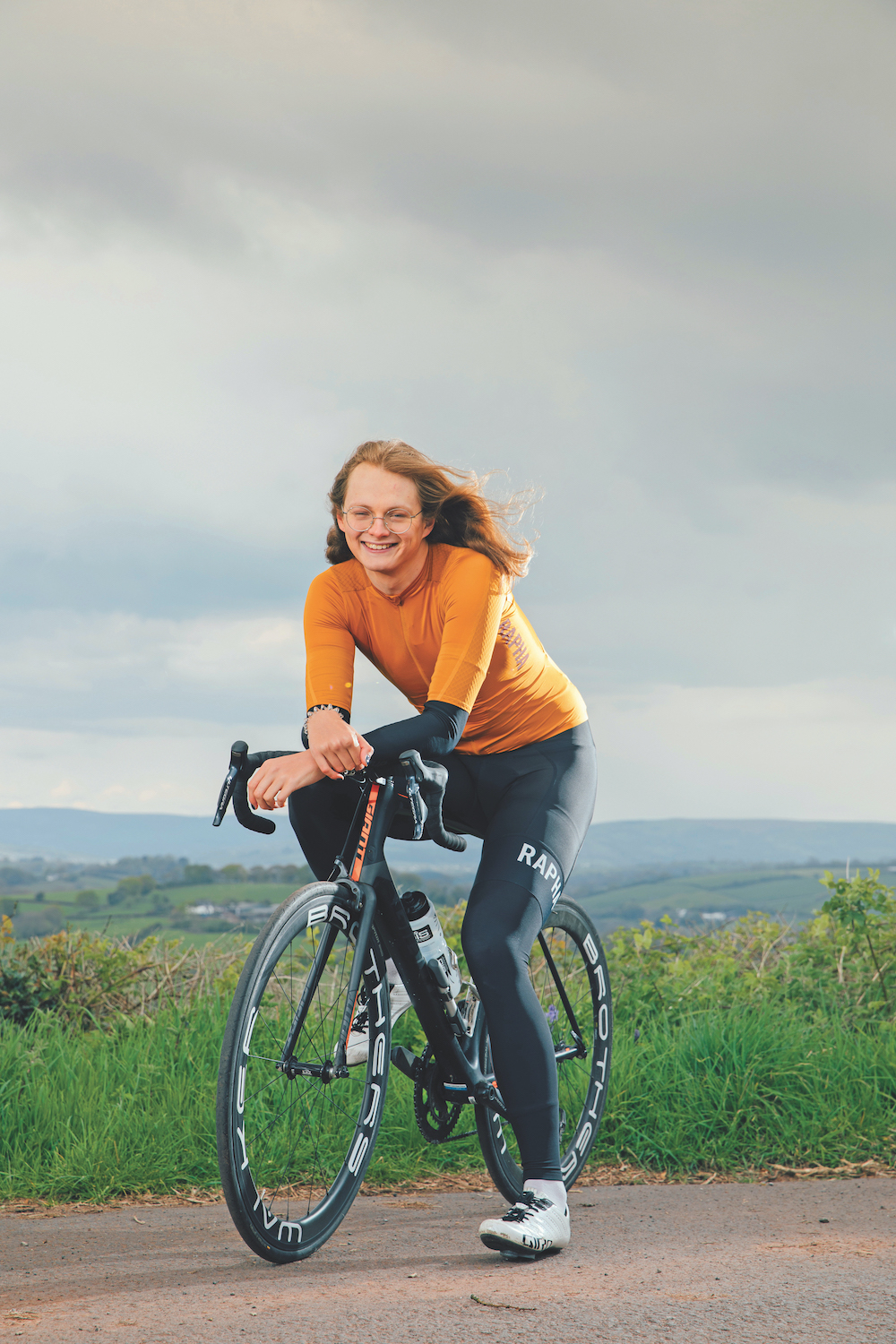
Emily Bridges is a 20-year-old trans woman who until last year had been setting national records in the junior male category – 18:42 for 10 miles, 47:27 for 25 miles – and had gained selection to British Cycling’s Senior Academy.
She made a courageous public statement last October, declaring that she was “no longer comfortable with not being true to myself in all aspects of my life” and was now a trans athlete.
“Things are changing, but cycling as it is at the moment is not massively accepting of LGBT people,” Bridges tells me by video call from her home in Wales. “It’s still a male-dominated, macho sport, bound up with lad culture and all the attached expectations around what you should be like as a cyclist.”
What forms of this did she experience personally? “It was just the gay jokes, being asked constantly ‘Are you gay?’ as if that would be a bad thing, and it always left me feeling uncomfortable,” Bridges pauses to think of a word to encapsulate the experience.
“It was just rubbish,” she sighs. Having started cycling as a youngster in 2012, inspired by watching the GB Olympic team train at Newport velodrome, Bridges loved racing but never felt she fully fitted in with the boys.
During her teens, as feelings of confusion around her gender identity intensified, she immersed herself in cycling as a form of escape.
“Being able to train kept me going through my teenage years,” she says. “It kept my head healthy, that was massively important.”
In 2019, amid a string of racing successes and a step up to BC’s Senior Academy, Bridges underwent surgery for an ankle injury, requiring three months’ rehab. It was during this downtime that she began to identify as trans.
Reflecting back on this turbulent period of her life, what would it have taken to make cycling a more inclusive, accepting environment?
“I think representation is a big factor, having role models in place, people to identify with and be inspired by,” says Bridges – who is far too modest to acknowledge that she herself is now a trailblazer.
“When it comes to homophobic banter, it needs to be taken more seriously by governing bodies. At the moment, it’s too easily dismissed as ‘boys will be boys’.”
Having started on the journey of medical transition, Bridges will not be eligible to race as a woman until next year at the earliest. She was dropped from the BC Academy last August, on performance grounds, but none of these hurdles have dimmed her determination to get back racing.
“I definitely want to return to the top level because being able to compete is really important to me – I just love it,” she enthuses.
“In the meantime, I’m just trying to fall back in love with the sport.” Bridges describes the reaction she has received from within the sport as “really positive” with an influx of supportive messages, albeit alongside a social media backlash from the small but vociferous anti-trans lobby.
Like Ryan, she is hopeful that future generations of LGBTQ+ riders will face less and less discrimination as machismo and sporting excellence are steadily decoupled.
“Sporting performance doesn’t need to be linked to gender expression – they’re not related,” she says. “Being yourself is far more important because if you’re not true to who you are, you won’t perform at your best.”
'It's easier for women'
As I gauged opinion in preparing to write this feature, one comment kept cropping up: “It’s easier for women” – as in, female pro riders can come out without fearing the consequences.
I didn’t want to presume this was true – in part because I couldn’t think of any British examples – so I arranged a call with US rider Tayler Wiles (TrekSegafredo), who has been openly gay for almost her entire pro career.
“Yeah, it’s definitely easier for women,” she affirms, speaking to me from Belgium on the eve of Liège-Bastogne-Liège.
“I think there are many reasons for that but personally I’ve never been on a team that hasn’t had at least one other gay rider – I didn’t have to think twice about coming out.”
Buttressed by strength in numbers, being gay has never been a cause for concern either among fellow riders or with team directors, explains the 31-year-old.
The Catch-22 for the men is that fear and uncertainty around how an openly gay rider might be treated is sustained by there being none.
What is it, in Wiles’s view, that inhibits a breaking of the silence?
“I’ve asked a few male cyclists why they think there are no openly gay men,” she says, “and their responses really surprised me. The guys I talked to were all between 20 and 26 and from countries that I thought were super-progressive, but there was still some homophobic reaction.”
Specifically what type? “One guy said, ‘I don’t think [a gay rider] would survive because it’s such a hard sport’,” Wiles laughs at the illogicality.
The equating of homosexuality with feminity and weakness for her betrays that “homophobia and misogyny go together” as a symptom of “men trying to dominate everything.”
Other male riders told her that they would be uncomfortable to have a gay teammate because “you know, getting changed together on the bus and stuff.”
Rejecting such anxieties point blank, Wiles calls out the homophobic tendency to “over-sexualise what it means to be a gay man”.
As a gay woman who has never had to conceal that part of herself in the sport, Wiles recognises that it must be “incredibly hard” for gay male pros, and urges men who feel secure in their sexuality to “step up, speak out and make it a more welcoming environment”.
Her own transformative power as one such figurehead was about to be perfectly demonstrated – in my very next conversation.
Representation matters
“I wasn’t yet openly gay when I first met Tayler [Wiles],” says former pro Molly Waver – speaking to me from Bristol on a break from her studies to become a paramedic.
“It was at the Tour of Ireland about eight years ago. She was there with her wife Olivia [Dillon, former pro] – at a time when it wasn’t so common to see openly gay couples.”
The sheer visibility of other gay riders had a profound effect on Weaver, she now reflects.
“If I hadn’t seen Tayler and Olivia just being themselves and living their lives together and that being fine, then coming out for me would have felt like stepping into very scary unknown territory.”
The meeting provided tangible reassurance that everything would be OK. “People always say that representation matters,” says Weaver, “but take it from me, it really does.”
The 27-year-old, who stepped away from the sport in 2018, points out the incongruity that in some apparently more macho sports such as rugby, several male players have come out and been readily accepted – male cyclists should feel confident to follow their lead, she suggests.
“If an existing pro comes out, it’s going to test the waters,” says Weaver, “and actually, even if some people [in cycling] do have a problem with it, the majority response is going to be so positive it will outweigh any minority who are annoyed or upset.”
She is careful to add the caveat that, as a woman, she cannot judge exactly how intimidating it would feel to be that first, pioneering male rider.
One rider who can help shed light on that question is 20-year-old Belgian cyclo-cross rider Justin Laevens (Proximus-AlphamotorsDoltcini). He came out publicly in January, and as someone competing in UCI races, he is as close as it gets to being that elusive phenomenon, an openly gay male pro rider.
“I had already told my team-mates, family and friends that I was gay [in November 2019],” Laevens tells me over Zoom.
“Everyone was so positive, it made me really happy.” Knowing he had the backing of those around him, Laevens felt no need to hold back when asked about his sexuality by journalist Tom Coninckx in the lead-up to the 2021 Belgian CX champs.
“I replied openly, yes, I’m gay, and then it was all over the world.” Did it feel like a risky thing to do? “At first, yeah, I wondered, ‘Will people hate me for this?’, but it’s been really, really positive,” Laevens beams. “I’ve had only good reactions. No one hates me!”
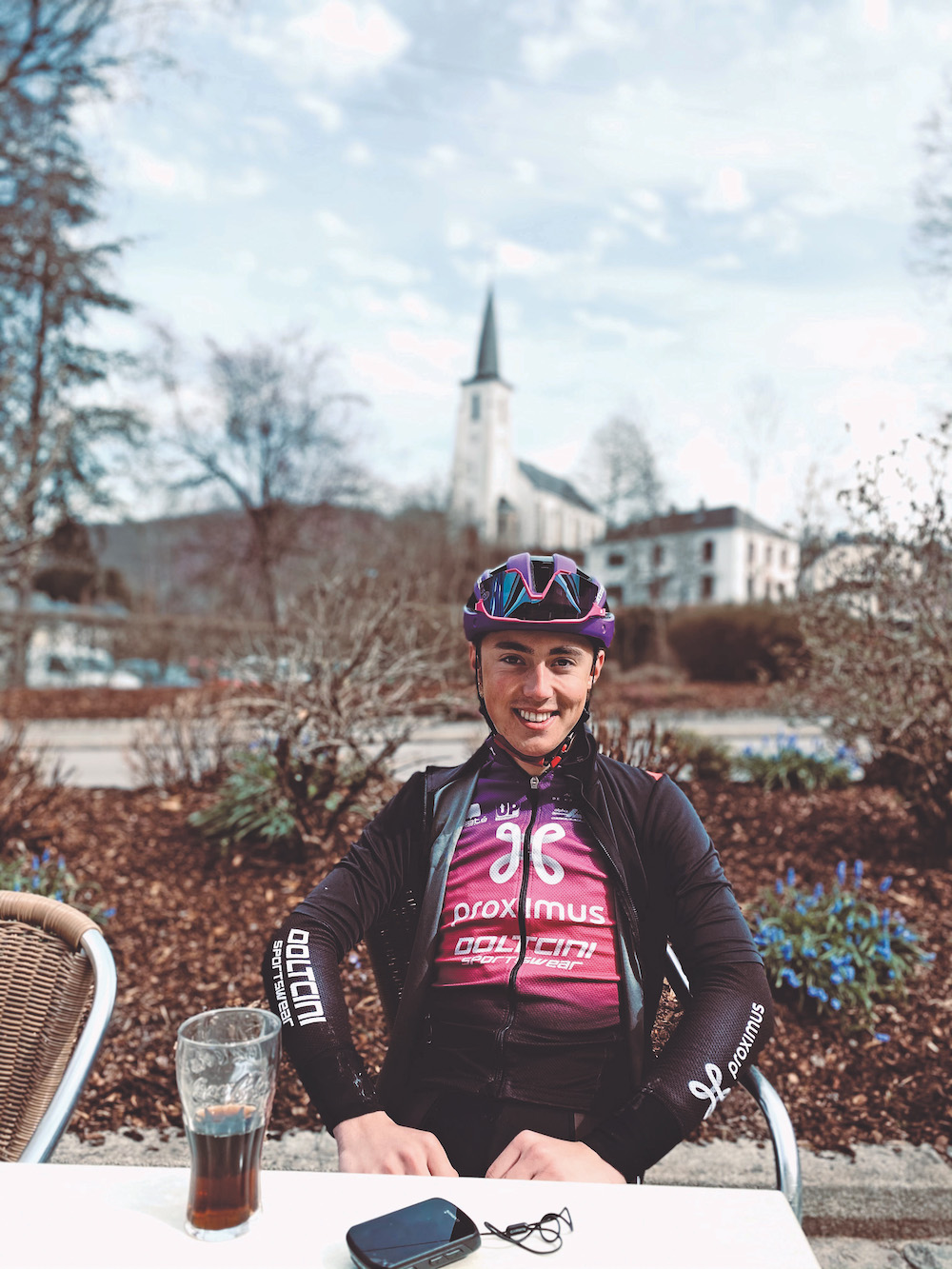
In the days afterwards “it went crazy on my Instagram”, he recalls – messages of support flooded in from fans and riders, including junior world CX champion Thibau Nys.
The media attention was similarly overwhelming, and all of the coverage “friendly and positive”.
I’m slightly taken aback; I had expected Laevens to relate at least one or two minor drawbacks or unwelcome comments, but no.
He smiles brightly and lists only benefits, which have been both personal and professional. Far from harming his marketability, coming out has skyrocketed Laevens’s profile – exemplified by a brand new car with his name emblazoned down the side, having been made an ambassador by his local DS dealership.
Why haven’t more riders come out, does he think? “I don’t know, but cycling is a very male-dominated sport, and so is cycling media, so maybe that is a factor. But it is only a matter of time.”
Are attitudes different among his generation, younger riders coming through the ranks? “Yeah, because at school there is now more information about sexuality,” says Laevens. “Being gay is acceptable and normal for younger riders, whereas maybe less so for some older guys.”
What would be his message to a gay rider who is considering following in his footsteps and taking that leap of faith? “First of all, you need to love yourself and be comfortable with who you are,” Laevens says thoughtfully. “Take your time and do it on your own terms. That way, when you do come out, mentally you will feel 100 per cent, and that will be good for your training and racing too – your head will be clear.”
Research and statistics - 'We need urgent action to stop discrimination’
A review of the research into LGBTQ+ discrimination and exclusion in sport by academics at Monash University in Australia, published in December, highlighted that as many as 82 per cent of athletes had witnessed homophobic or transphobic language in sport in the past six months.
In many cases, these slurs are used by people who claim to hold inclusive attitudes towards gay people, implying a disconnect between belief and behaviour.
The effect on participation is stark: young gay males play team sports at half the rate of their peers.
This research also found that, among LGBTQ+ youth, victims of sexuality-based discrimination are five times more likely to have suicidal thoughts. LGB youth are four times more likely to attempt suicide than their heterosexual counterparts, while trans youth are at six-times higher risk than cisgender youth.
The Monash review concluded by calling for “urgent, collaborative, solutionfocused research to identify ways to stop discriminatory behaviours and mitigate harm.” In the UK, the cycling group PrideOut, headed by Richard Hearne, has been campaigning for greater action from cycling’s governing bodies.
An open letter published by PrideOut last year, entitled ‘the Diversity and Inclusion Problem in Cycling’, set out a multi-pronged action plan calling on decision-makers to undertake research, educate, instigate change and stamp out prejudice.
It was signed by representatives from many large organisations including Scottish Cycling and Welsh Cycling but notably not by British Cycling.
“I’ve constantly been trying to get assistance from the big cycling bodies in the UK,” Hearne told CW, “but I’m banging my head against a brick wall. None of them seem to even acknowledge there’s a problem in terms of representation or participation.” The first step would be targeted research, he believes.
“If we don’t know how bad the problem is, how can there be any focus or resources to fix it?” CW asked British Cycling why it had refused to sign PrideOut’s open letter.
In response, a spokesman stated that BC was “working incredibly hard to ensure that cycling is a diverse, welcoming and supportive place for all,” adding that BC set up its first “Diversity and Inclusion Advisory Group” in February, which will be drawing up a “strategic framework” to achieve its goals.
Callum Skinner - ‘I felt forced to hide half my immediate family’
Olympic gold medallist Callum Skinner has been outspoken on LGBTQ+ representation in cycling since revealing that his younger brother Roy and dad Scott are gay:
“I actively hid my brother’s and dad’s sexuality. Having been to a very bohemian, middle-class school where other kids had gay parents, I’d felt comfortable about it.
""But when I moved to Manchester [to join the BC Academy], it was my first exposure to kids from diverse backgrounds, and that’s when I began to hear [homophobic] slurs.
"Even though it was mostly unintentional – most didn’t realise the impact their words were having – it made me feel I needed to hide a portion of my immediate family, which was tough.
"It was just my mum who would come to cycling events. Where it really hit home for me was in the lead-up to the 2016 Olympic Games. Team GB approach all the families to make sure that they are well supported in case there is an influx of media attention. My dad said he was happy to be on the programme and also happy to 'hide the gay thing'.
"That cut me in half – nothing else had cut through like that in years. I realised that my actions were inhibiting my dad from being who he was, contradicting the fact I was proud of who he was and what he stood for.
"Sprinting especially is very much a macho culture – all about being big and strong and not showing weakness – and so I didn’t really know how those around me would react.
"Fortunately, my experience of speaking openly about my dad and brother have been met with either total indifference, which is fantastic, or with support.
"People think it’s funny to regard indifference as positive, but that’s how it should be – not an issue. I’m against making any gay cyclist feel obliged to come out for the sake of the movement, as it has to be completely their own choice.
"The message we do need to send out is that, if a rider does make that decision, they will be 100 per cent backed and supported by the cycling community in the face of any adversity.”
You can read the full article in the May 27 issue of Cycling Weekly magazine. You can order the issue online if you're not going out, or you can subscribe to get it delivered each week save on the cover price and enjoy fitness features written by experts from around the world.
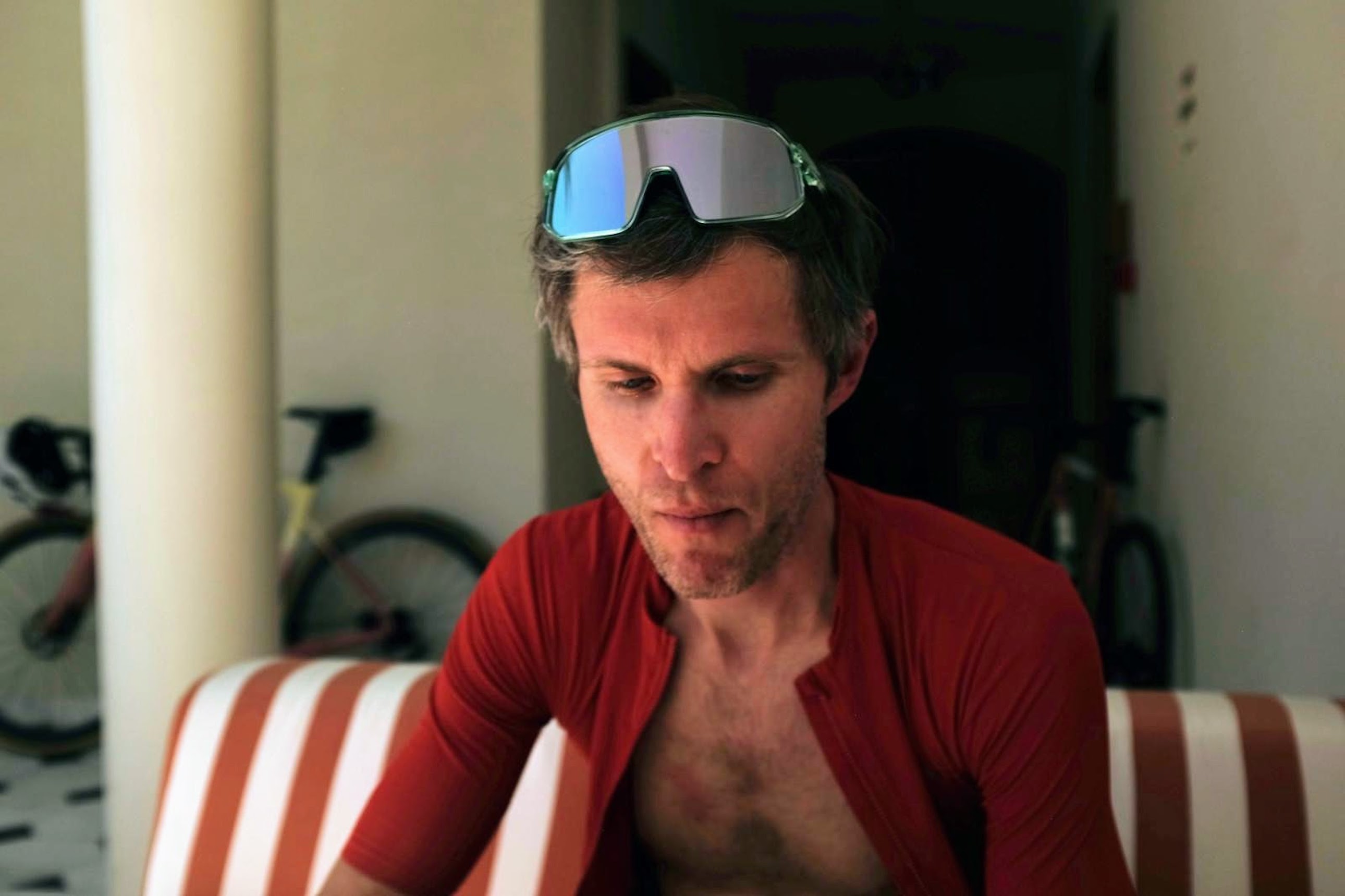
David Bradford is senior editor of Cycling Weekly's print edition, and has been writing and editing professionally for 20 years. His work has appeared in national newspapers and magazines including the Independent, the Guardian, the Times, the Irish Times, Vice.com and Runner’s World. Alongside his love of cycling, David is a long-distance runner with a marathon personal best of 2hr 28min. Diagnosed with retinitis pigmentosa (RP) in 2006, he also writes personal essays exploring sight loss, place, nature and social history. His essay 'Undertow' was published in the anthology Going to Ground (Little Toller, 2024). Follow on Bluesky: dbfreelance.co.uk